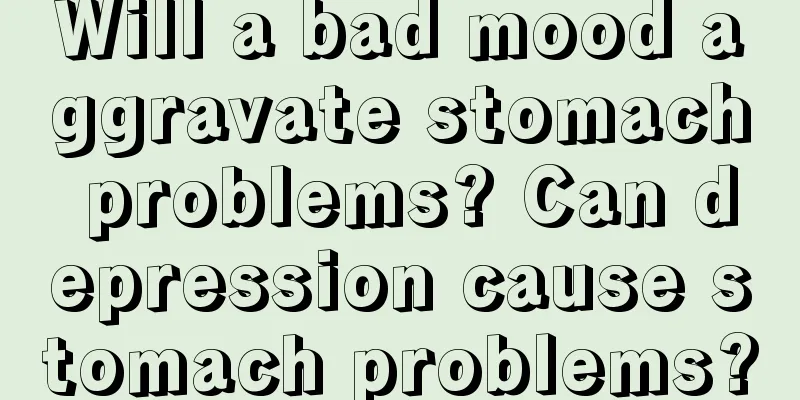Will a bad mood aggravate stomach problems? Can depression cause stomach problems?

|
People often say that people with cheerful moods will be in better health, and people who are easily depressed are prone to various diseases. As we know, depression can aggravate stomach problems. Why is this? Let's explain in detail the causes of stomach problems. Mood is the main factor affecting stomach problems. Will a bad mood aggravate stomach problems?The results all show that emotional distress is an important cause of gastric disease. For example, someone did an experiment in which a monkey was hung up and given electrical stimulation from time to time, causing the monkey to be in a state of anxiety and restlessness. Soon the monkey developed a gastric ulcer. Others used fiber gastroscopy, X-ray, electroencephalogram and biochemical overexcitation or inhibition, and autonomic dysfunction. In normal times, we often find that emotional distress, such as worry and anger, often significantly affects appetite and causes loss of appetite. This is called "worry hurts the spleen" and "liver and spleen imbalance" in traditional Chinese medicine. From a clinical point of view, experts have concluded that some patients with chronic gastritis have neurasthenia, long-term insomnia, anxiety, depression, or excessive mental stimulation, bad mood, long-term depression, etc. As a result, autonomic nervous system dysfunction leads to spasmodic contraction of gastric blood vessels, malnutrition of gastric mucosa, abnormal secretion of gastric glands, etc. Long-term disorder leads to chronic gastritis. Physiologically speaking, the liver is responsible for regulating qi and dispersing, while the spleen and stomach are responsible for transporting and digesting. The normal regulating qi and dispersing function of the liver is conducive to the digestion and absorption of the spleen and stomach. If the regulating qi and dispersing function of the liver is disordered due to poor emotions, the transport and transformation function of the spleen and stomach will be impaired, leading to the occurrence of spleen and stomach diseases, which are often manifested as stomach pain, nausea and vomiting, fullness, acid reflux, etc., which are called "liver and spleen disharmony" and "liver qi invading the stomach". Many modern scholars have believed through clinical research that the occurrence of chronic gastritis, gastric ulcers, and gastric cancer is mainly caused by frequent stimulation of the seven emotions, especially worry and anger, which cause liver and stomach disharmony, qi stagnation and blood stasis, and qi and blood imbalance. Therefore, in the prevention of gastric diseases, it is necessary to pay attention to the regulation of spirit and diet. Once you are sick, you should pay more attention to optimism and cheerfulness. In treatment, the method of soothing the liver and harmonizing the stomach is adopted to restore the regulating qi and dispersing function of the liver and regulate emotions to achieve the purpose of curing gastric diseases. What are the causes of stomach upset?1. Mental stressWhen a person is nervous, worried, or angry, his negative emotions can spread through the cerebral cortex to the limbic system, affecting the autonomic nervous system, directly leading to gastrointestinal dysfunction, secreting excessive gastric acid and pepsin, causing gastric vasoconstriction, pyloric spasm, emptying disorder, damage to the protective layer of the gastric mucosa, resulting in self-digestion and the formation of ulcers. 2. Excessive drinkingAlcohol itself can directly damage the gastric mucosa. Alcohol can also cause cirrhosis and chronic pancreatitis, which in turn aggravates stomach damage. 3. Excessive fatigueWhether it is physical labor or mental labor, if you are overly tired, it will cause insufficient blood supply to the gastrointestinal tract, secretory dysfunction, excessive gastric acid and reduced mucus, causing damage to the mucosa. 4. Unequal distribution of hunger and satietyWhen hungry, the gastric acid and protease in the stomach are not neutralized by food, and the concentration is high, which can easily cause the mucosa to self-digest. Overeating can easily damage the stomach's self-protection mechanism; excessive expansion of the stomach wall and long retention of food can also cause stomach damage. 5. Unclean foodHelicobacter pylori infection is one of the important causes of gastric and duodenal ulcers. The detection rate of this bacterium in ulcer patients is as high as 70-90%, and the bacterium disappears after the ulcer is cured. Ulcer patients can be infected through close contact such as tableware, tooth tools and kissing. Unclean food is also one of the causes of infection. 6. Overeating at dinnerSome people tend to concentrate the day's nutrition on dinner, or like to have a midnight snack or eat something before going to bed. Doing so will not only cause restless sleep and easily lead to obesity, but also stimulate the gastric mucosa and cause excessive secretion of gastric acid, which may induce ulcer formation. 7. Coffee and strong teaCoffee and strong tea are both central nervous system stimulants, which can cause ischemia of the gastric mucosa through reflex, destroy the protective function of the gastric mucosa, and promote the occurrence of ulcers. 8. Substance AbuseBecause of their busy work, some office workers buy painkillers for stomachache, which is wrong and can easily aggravate stomach problems. Painkillers are generally antipyretic analgesics. Antipyretic analgesics contain acetylsalicylic acid, caffeine, etc., which have a direct stimulating effect on the gastric mucosa and can promote gastric acid secretion, causing gastric acid to strongly stimulate the mucosa and ulcers again, aggravating gastrointestinal inflammation and even ulcer bleeding, which is like adding fuel to the fire and the more you treat, the more painful it becomes. In addition, anti-inflammatory drugs such as aspirin themselves hurt the stomach and may cause bleeding in gastric ulcers. Indomethacin, reserpine, etc. also have a stimulating effect on the gastric mucosa and should be taken with caution under the guidance of a doctor. 9. Eat fastAfter food enters the stomach, it is stored, ground, and digested, turning it into chyle before it can be discharged into the intestine. If you do not chew it thoroughly and swallow it hastily, the food will be rough, which will increase the burden on the stomach, prolong the retention time, and cause damage to the gastric mucosa. In addition, chewing slowly can increase saliva secretion, reduce gastric acid and bile secretion, and help protect the stomach. |
<<: How to divide baby rice cereal into sections? Why to divide baby rice cereal into sections?
>>: How to buy clothes for your baby? A guide to buying clothes for your baby
Recommend
Can babies eat water chestnuts? At what age can babies eat water chestnuts?
There are many things to pay attention to when it...
What should I do if the follicles develop slowly? The reason why the follicles grow slowly
With the development of today's society, the ...
Is it better for maternity bras to have underwires or without underwires?
Should pregnant women choose underwear with under...
What is the difference between getting pregnant at 25 and 35? What age is considered an advanced maternal age?
With the relaxation of the two-child policy, more...
Can postpartum hemorrhoids recover? How to treat postpartum hemorrhoids?
Hemorrhoids are a disease that many people have. ...
Baby bedtime story: Little penguin also has dreams
The little penguin is so cute, and it grows up wi...
What should I do if my baby has a stuffy nose? What should I do if my baby has a stuffy nose?
Newborns have a high metabolism when they are jus...
How many months can babies eat oil? How old can babies eat oil?
Oil is the most common food in our lives. Eating ...
What is the reason for the baby's dry stool? What is the reason for the baby's green stool?
Babies cannot speak and have no way to express th...
How to distinguish the authenticity of Tianxi Pills? How to distinguish the authenticity of Tianxi Pills?
Tianxi Pills are a kind of medicine that can help...
Can eating eggs improve intelligence?
Eggs are rich in nutrients and are very suitable ...
Is it safe for children to use stainless steel cutlery?
In addition to the stainless steel pots used for ...
Can black toothpaste whiten teeth? Can black toothpaste reduce inflammation?
Black toothpaste is a domestic brand, and has bee...
What should I do if the due date has not come yet? What should women pay attention to during pregnancy?
Many women are pregnant for about ten months. Aft...
How long does it take to fully charge a Philips electric toothbrush? What does the beeping sound mean when a Philips electric toothbrush is charging?
Electric toothbrushes are really good to use, but...









